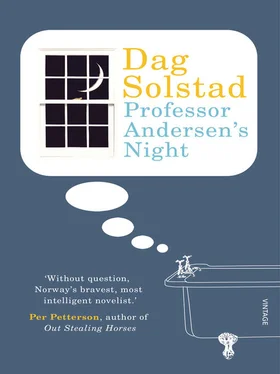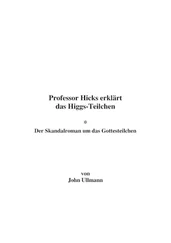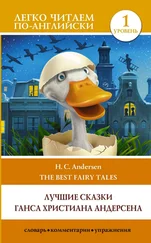Dag Solstad - Professor Andersen's Night
Здесь есть возможность читать онлайн «Dag Solstad - Professor Andersen's Night» весь текст электронной книги совершенно бесплатно (целиком полную версию без сокращений). В некоторых случаях можно слушать аудио, скачать через торрент в формате fb2 и присутствует краткое содержание. Год выпуска: 2011, Издательство: Harvill Secker, Жанр: Современная проза, на английском языке. Описание произведения, (предисловие) а так же отзывы посетителей доступны на портале библиотеки ЛибКат.
- Название:Professor Andersen's Night
- Автор:
- Издательство:Harvill Secker
- Жанр:
- Год:2011
- ISBN:нет данных
- Рейтинг книги:3 / 5. Голосов: 1
-
Избранное:Добавить в избранное
- Отзывы:
-
Ваша оценка:
- 60
- 1
- 2
- 3
- 4
- 5
Professor Andersen's Night: краткое содержание, описание и аннотация
Предлагаем к чтению аннотацию, описание, краткое содержание или предисловие (зависит от того, что написал сам автор книги «Professor Andersen's Night»). Если вы не нашли необходимую информацию о книге — напишите в комментариях, мы постараемся отыскать её.
Professor Andersen fails to report the crime. The days pass, and he becomes paralysed by indecision. Desperate for respite, the professor sets off to a local sushi bar, only to find himself face to face with the murderer.
Professor Andersen's Night
Professor Andersen's Night — читать онлайн бесплатно полную книгу (весь текст) целиком
Ниже представлен текст книги, разбитый по страницам. Система сохранения места последней прочитанной страницы, позволяет с удобством читать онлайн бесплатно книгу «Professor Andersen's Night», без необходимости каждый раз заново искать на чём Вы остановились. Поставьте закладку, и сможете в любой момент перейти на страницу, на которой закончили чтение.
Интервал:
Закладка:
Right from the start Professor Andersen had assumed that it wasn’t Henrik Nordstrøm’s wife he had seen at the window on the night before Christmas Day, but a casual female acquaintance, a girfriend of his, or suchlike. That was his assumption, on impulse, something he had never questioned before now, when it turned out that no woman was reported missing. He had expected that the description of this woman would be issued after a few weeks, fourteen days after Christmas Eve at the latest, in other words during the first or second week of January, and that he would then follow the newspaper reports about the search for this woman, how it slowly closed in on this apartment at Skillebekk, where Henrik Nordstrøm was sitting and tensely following the same hunt as he himself, Professor Andersen, in his spacious apartment on the other side of the street. But where was the body? Actually, Professor Andersen had imagined that one day, from his observation post, he would see two policemen entering the main door of the building on the other side of the street and ringing the doorbell at Henrik Nordstrøm’s place. If the light was on in the window, he might be able to see all three moving about in there, the two uniformed men and the unfortunate Henrik Nordstrøm. But where was the body? Sooner or later suspicion would lead them to Henrik Nordstrøm but what could they do without the body? Probably very little. He, Professor Andersen, was the only person who had seen what had happened, and his lips were sealed. Why? ‘And why did I leave the Britannia Hotel in Trondheim, head over heels, when I feared that he might simply disappear from here, for good?’ Professor Andersen asked himself, yet another time, over and over again.
But as time passed what was most probable was that it hadn’t been a casual female acquaintance, a girlfriend, who had been standing at the window, but his wife, whom he had murdered. That made the whole thing much more difficult for Henrik Nordstrøm, who, once suspicion had been aroused over the disappearance, would only have one opportunity to avoid being caught: if he himself reported her missing. If others reported her missing, Henrik Nordstrøm would, in reality, be finished. Even without the body. For as soon as she was reported missing, then it would turn out that she was, in fact, missing, and why hadn’t Henrik Nordstrøm reported it? Viewed in that light it was now just a question of time before he was finished, and Professor Andersen’s failure to report what he had seen wouldn’t be of any consequence. He was finished, whether Professor Andersen opened his mouth or not didn’t matter.
Between the months of January and February this had become quite clear to him, and it eased a little of the strain he had been living under recently. He now managed to concentrate fully on his duties as a professor of literature at the University of Oslo. True enough, Professor Andersen practised this calling in a context which didn’t make him feel light-hearted. Indeed, the context in which he now found himself had darkened his existence, his mind even, for several years, and to an ever greater extent. When all was said and done, Professor Andersen had a strong suspicion that he had spent his life on something that was doomed to perish. He was a professor of literature and he could no longer say that there was as great a value attached to literature as he had thought at the time when he chose it for his course in life. At any rate, not the literature he had applied himself to in performance of his duties, but also for pleasure. He did research on Ibsen. He had completed an enthusiastically received doctorate on The Pretenders as a fairly young man, but in recent years had been preoccupied solely with the plays Ibsen wrote in the 1880s and 1890s, that is to say, with the great Henrik Ibsen. There could scarcely be any doubt that if Ibsen had died in the year 1880, at fifty-two years of age, he would have been forgotten as a playwright today. Peer Gynt and Brand would scarcely have been performed on any stage in the twentieth century, except perhaps in Norway. A Doll’s House would also have been considered out-dated, if it weren’t for support from plays like Ghosts, The Wild Duck, Rosmersholm, Hedda Gabler, The Master Builder, John Gabriel Borkman and When We Dead Awaken . His own doctorate on The Pretenders would have been regarded as a curiosity, and he would probably have been warned not to start on it, mainly due to the fact that a study of Norwegian drama around 1860 which took Bjørnson’s historical dramas as a starting point would be much more rewarding, from both a historical and a literary perspective. So for that reason, throughout the past ten years Professor Andersen had been preoccupied solely with studying the great Ibsen, the Ibsen who made possible his doctorate on the (relatively speaking) forgotten work, The Pretenders , and in consequence made his position as professor of literature possible, he thought, with a smile tainted by malevolence.
He had made use of all his imaginative and intellectual skills to depict Henrik Ibsen’s dramas from the 1880s and 1890s, so that their greatness would stand forth in a shining light. As a professor he saw this as his task. What the students, whom he tried to enlighten in this manner, didn’t know, was that he himself felt a gnawing sense of doubt as to whether this greatness actually existed, when all was said and done. He found himself having to take an extreme perspective in his interpretations, because if one couldn’t view Ibsen’s greatness in an extreme perspective, then one had to ask oneself whether there was any point in applying oneself to these dramatic works from the previous century, except in a strictly historical sense, which, of course, a nation ought to find a worthy cause, every so often. Take Bjørnson for instance, said Professor Andersen to himself. Even if there were people among us who only wish to be convinced of Henrik Ibsen’s eternal greatness, and with that in mind go to the theatre to see a modernised Henrik Ibsen standing before them. One accepted everything, absolutely everything: inflated sex dolls, giant penises in plastic, Oswald as a neo-Nazi, long-haired punks, a peace negotiator with AIDS, a UN soldier stationed in Bosnia at home on leave, absolutely everything that one could imagine in the form of theatrical costumes to dress up poor fictive Oswald, all of it was swallowed if only one could perceive the eternal spirit of Ibsen breathing through this young man of our own day and age. As a professor, however, Andersen saw it as his task to concentrate on Ibsen’s text, and search for greatness there. His students also yearned to feel the eternal spirit of Ibsen breathing on them. There were indeed master’s degree students who spent up to two years of the precious spring of their youth immersing themselves in Ibsen’s text. Why did they do that, really? On occasion Professor Andersen asked himself this, often sarcastically, too, if the truth be told. For why should a nice, amiable girl from Bærum be so fascinated by Rebekka West that she simply had to write a longish thesis about her in her own twenty-third year? Now and again it was beyond Professor Andersen’s comprehension, not least her daring to admit it. Professor Andersen could safely say that he wouldn’t have dared to admit it, if he were her, but she went around with her alleged enthusiasm for this intolerably sultry and morbid woman, not just at the university, but also in her circle of friends, indeed even in her childhood home, in the well-kept suburb of Bærum. Could it be that she was strangely fascinated by the thought of feeling Henrik Ibsen’s eternal spirit flowing through this woman, whom she was going to devote a year and a half of her young life to describing? Yes, indeed, that had to be the case, and this made Professor Andersen’s sarcasm creep away. For the fact remained that there were young students who yearned to apply themselves to Henrik Ibsen’s one-hundred-year-old dramas and they flocked around Professor Andersen’s seat of learning. In his lectures they would hear the notion of Henrik Ibsen’s greatness being confirmed and enlarged upon, in that way contributing to it being consolidated yet again for new generations, even though Professor Andersen himself did, in fact, doubt, ultimately, whether any such significance for which they yearned, and which he did his utmost to confirm, really existed; at least, it didn’t for those people with whom he shared a common fate and the passage of time, for if one pared away all cultural yearning as well as vanity, necessary though it may be, both on behalf of himself, his day and age, and of humanity, and scrutinised the real enthusiasm in their heart of hearts for these masterpieces, for traces of a flame burning there, then he didn’t expect to find any such flame. But he took good care to conceal these doubts from his students, as he might have made a fundamental error in those judgements that darkened his mind.
Читать дальшеИнтервал:
Закладка:
Похожие книги на «Professor Andersen's Night»
Представляем Вашему вниманию похожие книги на «Professor Andersen's Night» списком для выбора. Мы отобрали схожую по названию и смыслу литературу в надежде предоставить читателям больше вариантов отыскать новые, интересные, ещё непрочитанные произведения.
Обсуждение, отзывы о книге «Professor Andersen's Night» и просто собственные мнения читателей. Оставьте ваши комментарии, напишите, что Вы думаете о произведении, его смысле или главных героях. Укажите что конкретно понравилось, а что нет, и почему Вы так считаете.












